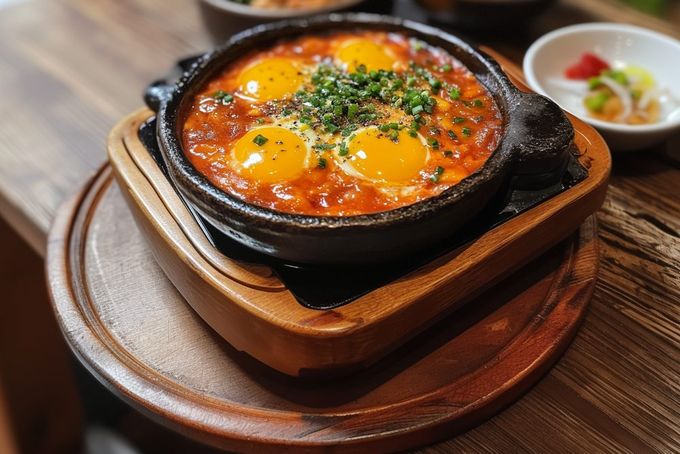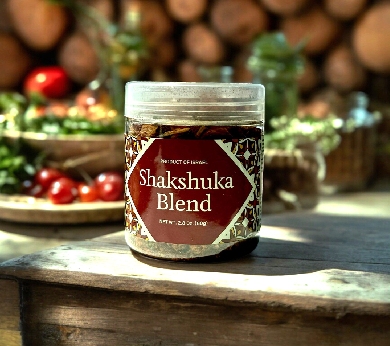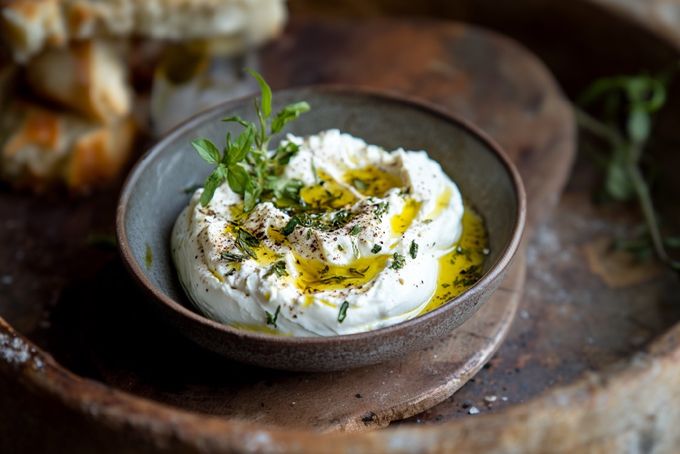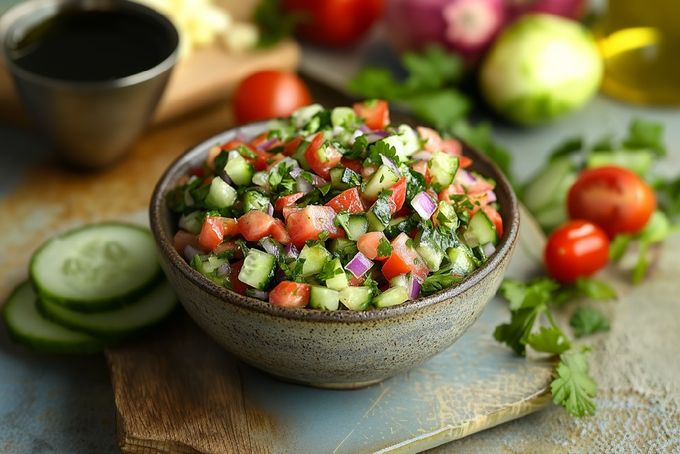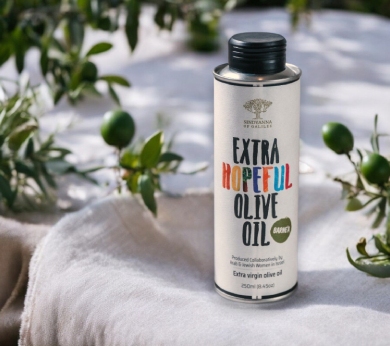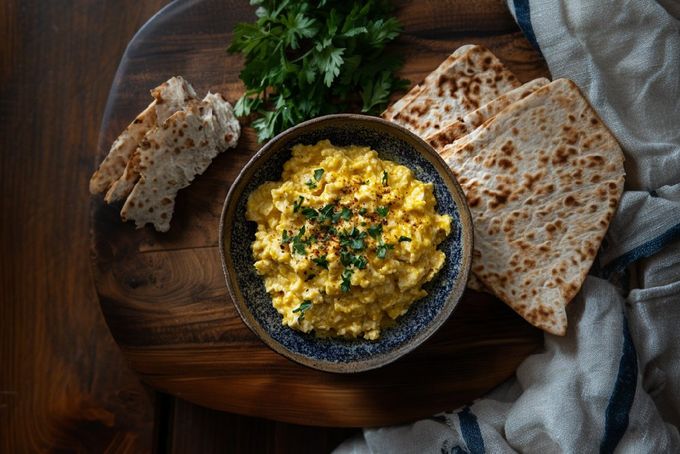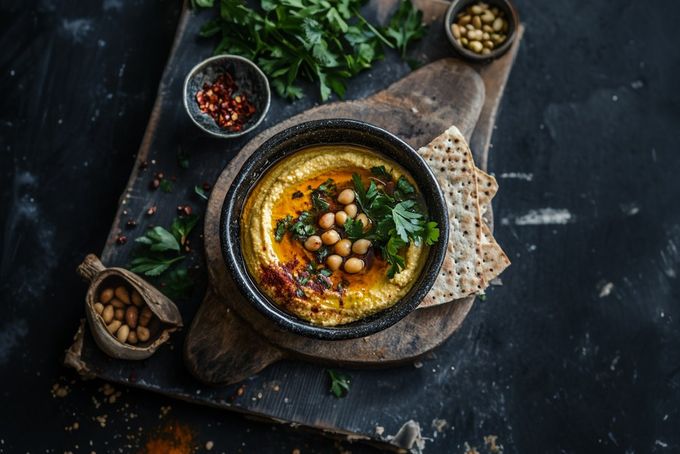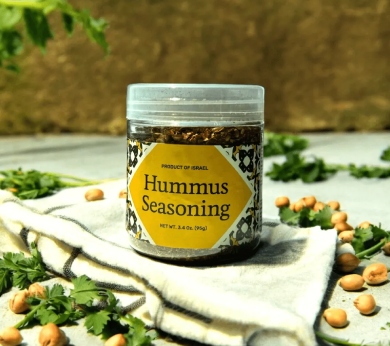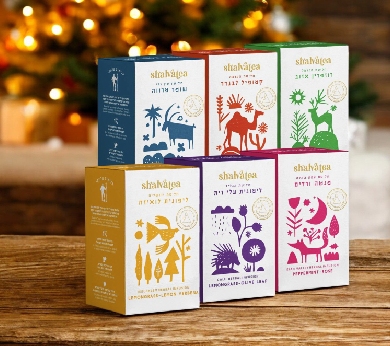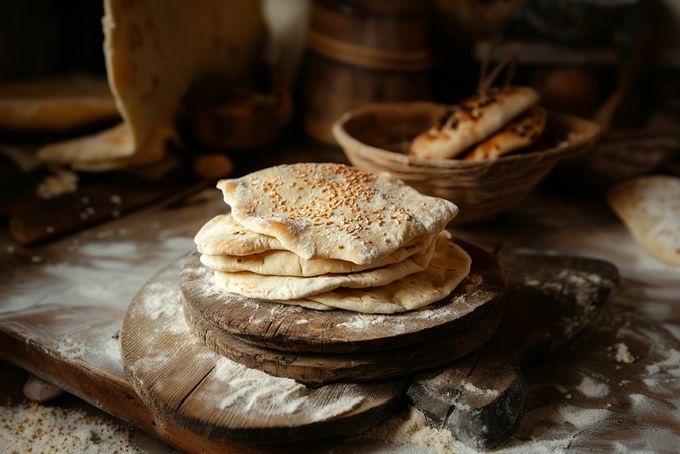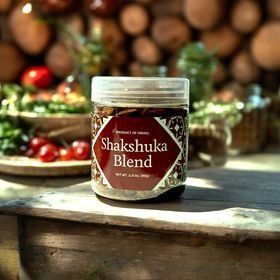What Is a Traditional Israeli Breakfast? 8 Types of Dishes
Start your day the Israeli way! ☀️🍳 Discover the delicious dishes that make up a traditional Israeli breakfast.
Published December 24, 2024.
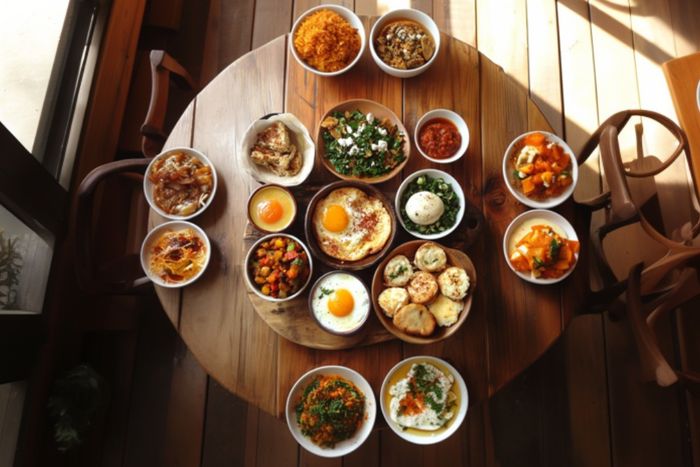
You've booked the trip of a lifetime to Israel. You're dreaming of ancient wonders, vibrant cities, and breathtaking landscapes. But there's one crucial aspect of cultural immersion you've completely overlooked: breakfast.
Let's be honest: A bland, uninspired breakfast is a terrible way to start your day, especially in a country with a culinary scene as rich and diverse as Israel's.
Prepare to be delighted as we unpack the essential Israeli breakfast dishes. From creamy dips to flavorful salads, savory egg dishes, and freshly baked bread, get ready to ditch the boring breakfast and embrace the vibrant feast that is a true Israeli morning.
» Season your Israeli breakfast with a traditional spice blend set
What Sets Israeli Breakfast Dishes Apart?
1. Mediterranean Freshness
Israeli breakfasts highlight fresh, local ingredients like cucumbers, tomatoes, and herbs. These are often served in a chopped salad. This emphasis on freshness comes from Israel's Mediterranean climate and agricultural history. It ensures that meals are vibrant, healthy, and flavorful.
This focus on fresh produce sets Israeli breakfasts apart from heavier, more processed ones found in other cuisines. It's a refreshing way to start the day and naturally includes options for vegetarians and vegans. The importance of vegetables also reflects the agricultural heritage of the Israelites, as seen in the Bible when Daniel requests a vegetarian diet (Daniel 1:12).
2. Dairy Focus
Soft cheeses (like cottage cheese), yogurt (often labneh), and other dairy products are key parts of Israeli breakfasts. This showcases Israel's high-quality dairy industry. These items are enjoyed plain, seasoned, or with fresh bread and vegetables.
The Bible often uses milk as a symbol of nourishment. For example, Abraham offered curds and milk to angels (Genesis 18:8), and the Promised Land is described as "flowing with milk and honey" (Exodus 3:8).
» Fire up the grill and get our must-try Israeli shawarma recipe 🍗
3. Egg-Based Dishes
Eggs are common in Israeli breakfasts but not in the typical boiled, fried, or omelet styles seen elsewhere. Instead, they are combined with other ingredients. They are also often part of Jewish celebrations.
4. Bread and Grain
Fresh, warm bread like pita or challah is a staple. It's used for dipping in olive oil, spreads, or scooping up eggs and salads. This creates communal and interactive dining, reflecting the Levantine tradition of shared meals.
Bread has deep significance in the Bible. Jesus broke bread with his disciples at the Last Supper (Matthew 26:26), and unleavened bread is essential to Passover (Exodus 12:15-20).
5. Abundance and Variety
Israeli breakfasts often feature a buffet-style presentation with a wide variety of vegetables, olives, dairy, grains, and fruit. This abundance caters to different tastes and dietary needs.
It also connects to the biblical description of the land's abundance ("A land of wheat and barley, vines and fig trees, pomegranates, olive oil, and honey," Deuteronomy 8:8).
This plentiful breakfast tradition may have started in the kibbutzim, where a large breakfast was necessary to fuel a day of hard work. It's a stark contrast to the more minimalist breakfast styles found in other parts of the world.
» Discover the foods mentioned in the Bible 🍇
8 Types of Dishes in a Traditional Israeli Breakfast
1. Shakshuka
Shakshuka is a classic Israeli breakfast dish with North African roots. It features eggs simmered in a flavorful tomato sauce with onions, garlic, peppers, and spices like cumin and paprika. Often cooked in a cast-iron skillet with olive oil, it's served with bread for dipping and sometimes accompanied by salads or spreads.
Originating in Tunisian Jewish communities, shakshuka became a staple in Israel after 1948, reflecting the country's diverse culinary landscape. Regional variations exist, with additions like fresh herbs or goat cheese in some areas.
This vegetarian-friendly dish—which can be gluten-free—highlights Israel's agricultural heritage through its use of fresh tomatoes, quality olive oil, and regional spices.
2. Labneh
Labneh is a tangy, creamy cheese made by straining yogurt to remove the whey. This simple process results in a thick, spreadable cheese that's a staple in Israeli cuisine.
Often seasoned with olive oil, za'atar, and herbs, labneh is served as a centerpiece of Israeli breakfasts with fresh bread, vegetables, and olives. Originally from the Levant, labneh reflects culinary traditions brought to Israel by immigrants.
While enjoyed across Israel, labneh may be served with modern twists in cities, while rural areas often keep the presentation traditional. Abundant dairy farms ensure high-quality milk for its production.
Labneh is gluten-free, vegetarian, and high in protein. Its versatility allows for customization, even with vegan alternatives. Core ingredients like olive oil and za'atar celebrate Israel's agricultural diversity.
» Warm up this winter ❄️☕ Make a traditional Israeli winter drink
3. Israeli Salad
Israeli salad is a refreshing mix of finely chopped cucumbers, tomatoes, onions, and parsley, simply dressed with olive oil and lemon juice. Fresh, local ingredients are key, creating a vibrant salad that perfectly complements Israeli breakfasts. It's often served alongside labneh, hummus, and fresh bread, providing a light counterpoint to richer dishes.
With origins in the Middle East, this chopped salad became a staple in Israel, symbolizing simplicity and fresh produce. Regional variations may include additions like mint or chili peppers. Naturally vegan and gluten-free, this salad is also healthy and delicious.
4. Matzo Brei
Matzo brei is a classic Ashkenazi Jewish dish made from softened matzah fried with eggs and often seasoned with salt and pepper. It can be enjoyed sweet (with sugar or fruit) or savory (with sour cream, vegetables, or Israeli-style pickles).
Originating as a way to use leftover matzah during Passover, it's now a beloved comfort food in Israel, commonly eaten for breakfast year-round, especially during Passover.
Matzo brei is naturally gluten-free and can be made vegan by using oil instead of butter. This simple, hearty dish reflects Israel's culinary tradition of utilizing basic, local ingredients for a protein-rich meal.
» Spice up your life with the flavors of the Holy Land ✨
5. Hummus
Hummus is a creamy spread made from chickpeas, tahini, lemon juice, garlic, and olive oil. It's a staple of Israeli breakfasts, often served with warm pita, salads, pickles, and fresh vegetables.
Originating in the Levant, hummus is enjoyed throughout the Middle East. In Israel, it reflects both regional heritage and local tastes, with variations found across the country.
Naturally vegan and gluten-free, hummus is a nutritious and delicious addition to any meal. Its core ingredients, like tahini and olive oil, are staples of Israeli cuisine, showcasing the country's agricultural richness.
6. Bourekas
Bourekas are flaky pastries filled with savory ingredients like cheese, potatoes, or spinach. Brushed with egg wash before baking, they have a crispy, golden crust. Fillings are often spiced with za'atar, a Middle Eastern herb mix.
Served warm, bourekas are a popular Israeli breakfast food, often accompanied by salad or yogurt. They originated in the Ottoman Empire but have been adapted to include local Israeli flavors.
Regional variations abound, with Tel Aviv favoring cheese and potato fillings, while the north features more spinach and meat. You can make Bourekas to suit various dietary needs, with vegan and gluten-free options available. They showcase Israel's use of fresh, local ingredients.
» Learn how to make Sumac Roast Chicken with this authentic recipe 😋
7. Mandelbrot
Mandelbrot is a traditional Jewish cookie similar to biscotti. Made with flour, sugar, eggs, butter (or oil), and a pinch of salt, the dough is enriched with almonds for a nutty flavor and crunch.
The dough is shaped into logs, baked until golden, sliced, and baked again for extra crispness. Perfect for dipping in coffee or tea, mandelbrot is often enjoyed with warm beverages for breakfast or a snack.
Originating in Eastern Europe, mandelbrot has Ashkenazi Jewish roots. Its name means "almond bread" in Yiddish. The second baking, similar to biscotti, reflects Italian influence. Mandelbrot became popular in Israel, blending Jewish and local culinary traditions.
You can even make a vegan version with plant-based alternatives to butter and eggs. Gluten-free flour makes it suitable for those with sensitivities. With simple ingredients like almonds and sugar, mandelbrot embodies the essence of Israeli home baking.
8. Fresh Bread and Pita
Fresh bread and pita bread are essential in Israeli cuisine, especially for breakfast. Made with simple ingredients like flour, water, yeast, and salt, they are baked in traditional ovens at high temperatures, resulting in unique textures and flavors. Pita has a distinctive "pocket," while fresh bread is typically a soft loaf.
Served with almost every meal, these breads are often paired with spreads like hummus and tahini alongside Israeli salad and olives. Pita is perfect for scooping, while fresh bread is ideal for tearing and dipping.
Bread-making in the region has a long history, influenced by Middle Eastern and European cultures. Pita bread, with origins in ancient Levantine cultures, is a symbol of Israel's diverse heritage.
Regional variations exist, with Jerusalem having denser pita and Tel Aviv featuring lighter bread, reflecting local tastes and baking styles. While not gluten-free, gluten-free versions are available. With their simple ingredients, fresh bread and pita bread are versatile staples of Israeli cuisine.
» Cozy up with a bowl of Israeli comfort food 🍲
Breakfast Like a Local: Your Guide to the Perfect Israeli Morning
So there you have it—a delicious deep dive into the heart of the traditional Israeli breakfast. No longer will you be left wondering what wonders await you at the breakfast table.
From the creamy embrace of hummus and labneh to the spicy kick of shakshuka and the refreshing crunch of Israeli salad, you're now armed with the knowledge to navigate any Israeli breakfast spread like a pro.
So, start your day with a true Israeli breakfast and experience a culinary adventure that will fuel your body and soul for all the wonders this incredible country has to offer. B'teavon (bon appétit)!



